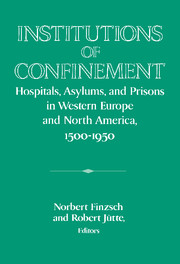 Institutions of Confinement
Institutions of Confinement Book contents
- Frontmatter
- INTRODUCTION
- PART ONE HOSPITALS AND ASYLUMS
- 3 The Transformation of the American Hospital
- 4 The Construction of the Hospital Patient in Early Modern France
- 5 Before the Clinic Was “Born”: Methodological Perspectives in Hospital History
- 6 Syphilis and Confinement
- 7 Madhouses, Children's Wards, and Clinics
- 8 Pietist Universal Reform and Care of the Sick and the Poor
- PART TWO PRISONS
- Index
5 - Before the Clinic Was “Born”: Methodological Perspectives in Hospital History
Published online by Cambridge University Press: 05 January 2013
- Frontmatter
- INTRODUCTION
- PART ONE HOSPITALS AND ASYLUMS
- 3 The Transformation of the American Hospital
- 4 The Construction of the Hospital Patient in Early Modern France
- 5 Before the Clinic Was “Born”: Methodological Perspectives in Hospital History
- 6 Syphilis and Confinement
- 7 Madhouses, Children's Wards, and Clinics
- 8 Pietist Universal Reform and Care of the Sick and the Poor
- PART TWO PRISONS
- Index
Summary
INTRODUCTION
Changes in the role of the hospital play a critical part in Michel Foucault s The Birth of the Clinic, originally published in 1963. To Foucault, French hospitals after the Revolution were seemingly engulfed in a sudden process of “medicalization” that allowed physicians to impose their own agendas and convert these institutions into the workshops of a new medicine. After dissolution of the medical faculties in 1794, the National Convention in France opened the way for hospitals to become the new sites for medical learning and teaching. Patients were pressed into service for medical science. According to Foucault, French physicians considered the new hospital not merely a locus to verify disease descriptions, but a place to actually observe and discover clinical facts at the bedside.
Foucault s recognition of the nineteenth-century hospital as a site for the construction and dissemination of medical knowledge largely ignored earlier developments. Arguing for a national style or French Sonderweg, he characterized all earlier clinical activities in other countries as representing an “old” clinic or “protoclinic.” Indeed, Foucault s choice of the word “birth” was probably meant to dramatize his postulated shift and dismiss the importance of previous medical advances. His thesis of a sharp gulf separating the ideas and activities of postrevolutionary French medical professionals from events elsewhere in Europe has been widely accepted by historians.
- Type
- Chapter
- Information
- Institutions of ConfinementHospitals, Asylums, and Prisons in Western Europe and North America, 1500–1950, pp. 75 - 96Publisher: Cambridge University PressPrint publication year: 1997
- 1
- Cited by


